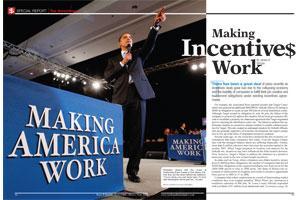

There has been a great deal of press recently on incentives deals gone bad due to the collapsing economy and the inability of companies to fulfill their job creation and investment obligations under existing incentives agreements.
For example, the Associated Press reported recently that Target Corporation was assessed an additional $600,000 by DeKalb, Illinois for failing to fulfill its obligation to create at least 500 jobs at its local distribution center. Although Target missed its obligation by only 66 jobs, the failure of the company to proactively address the situation forced local government officials to invalidate a property tax abatement agreement that Target negotiated prior to selecting the distribution center site. The failure to address this unfortunate situation in a proactive manner resulted in a public relations problem for Target. This also created an unpleasant situation for DeKalb officials, who are generally supportive of economic development, but expect companies to live up to the terms of negotiated incentives contracts.
Several years ago, no one could have predicted the dire economic circumstances that many companies face today. Even the largest companies with the strongest balance sheets are suffering financially. Further, more than 8 million jobs have been lost since the recession started in December 2007. When Target prepared its location cost analysis for the DeKalb site, incentives may have influenced the final location decision. Now, however, Target’s failure to address the situation on a proactive basis may result in the loss of hard fought incentives.
In states such as Texas, where companies can obtain incentive money prior to fulfilling their obligations, the number of companies that did not fulfill their obligations in the required timeframe rose from seven for the 2004-2008 period to nine in 2008 alone. The State of Illinois has increased its enforcement of recapture provisions in incentive agreements from just six in 2005 to 37 in 2008.
Companies that reduce employment as a result of deteriorating market conditions face even tougher penalties. When Pfizer, Inc. announced a workforce reduction of 600 jobs, St. Louis County officials responded with a re-think of $7 million in tax abatements and reductions promised over a 10-year period. Dell Inc. was forced to repay more than $26 million to Winston-Salem and Forsyth County, North Carolina as a result of the company’s decision to close their facility in January 2010 – four years and four months after the plant opened in October 2005, resulting in a loss of more than 900 local employees.
States and Cities “Strapped”
An increasing number of states and cities face an uncertain financial future as tax revenues plummeted while obligations to existing programs and retirement plans continue to soar. Many cities are scrambling to deal with this revenue shortfall and incentives are getting increased scrutiny from city and state officials. Incentives policies that do not meet strict cost/benefit objectives are being cut. Projects that fail to generate required jobs/incentive ratios are subject to termination.
At the same time, businesses are faced with falling profit margins from decreasing revenue and an increase of competition from low-cost, off-shore locations which can undercut prices and eliminate proprietary advantages. Add to this the prospect of offshore tariffs, currency manipulation, and other factors inhibiting the expansion of international markets, and one can easily see that domestic companies are feeling the squeeze as much or more than their public sector counterparts. Any expenditure of corporate funds, particularly those related to new operations, expansions or relocations, where the financial impacts can be felt for 10, 20 or 30 years, is getting intense scrutiny at the Senior Management level. Areas that do not provide financial or other governmental assistance to offset the increased risk these companies face are less likely to attract new corporate facilities under unpleasant present-day scenarios.
Incentives have become increasingly more important to the success of companies seeking to locate jobs in the United States and Canada as tight margins make even the smallest bit of governmental financial assistance count more than ever.
The U.S. government has become more active by providing low-cost financing and grant monies to companies in a number of energy-efficiency related industries, such as electric vehicle manufacturing, advance battery technology, and renewable fuels manufacturing. There is no guarantee that the financial investment in these industries will pay off in the form of jobs and profits. However, federal laws generally require job creation goals to be met for each $50,000 of investment, with severe penalties if these goals are not met within a three to five year timeframe.
Avoiding Recapture
A survey of over 200 Fortune 500 CFOs conducted by The RSH Group illustrates how companies often neglect to properly manage their commitments due to lack of qualified personnel, competing internal priorities and/or change in ownership. Moreover, this study shows that most companies lack the dedicated resources necessary to ensure compliance by monitoring performance related to job creation and new investment.
Frequently, incentives negotiations are conducted between corporate facilities personnel and city/state officials without adequate forethought on compliance requirements and issues. In addition, many companies do not have the management tools necessary to track incentives compliance dates and reporting needs in a proactive manner. Compounding the problem, many companies hire outside consultants who are compensated solely on the projected amount of benefits, not the actual results. Many outside consultants, lawyers and brokers provide site selection and incentives negotiations expertise for a price, but that often means that the company is paying for potential benefits which may never be realized without proper incentives management and collections procedures during the all-important compliance period.
Many companies, particularly large ones, who feel as if they have existing internal resources to adequately manage incentives compliance learn too late, that employee turnover, shifting responsibilities, and/or changing corporate priorities often results in missed compliance dates and inadequate management of incentives commitments. This lack of oversight and attention to detail has cost companies billions of dollars in lost incentives annually.
The RSH Group survey of Fortune 500 CFOs shows that only 12 percent of all respondents think their company is receiving more incentives than their industry counterparts. Over 88 percent of all respondents either don’t believe that their company is getting similar incentives or have no idea how they compare with other companies in the area of incentives utilization.
Scientific studies of incentives and their effectiveness by Peter S. Fisher and Allan H. Peters of the University of Iowa estimated a decade ago that over $50 billion in state and local incentives are made available annually to expanding and relocating companies. The recent expansion of incentives programs tied to energy independence and economic stimulus has likely increased this pool to more than $80 billion per year -yet only a fraction of these incentives are ever collected. RSH estimates that, of this $80 billion in annually available incentives, only $20 billion is actually negotiated and only 50 percent, or $10 billion, is ever realized by the recipient.
State and local barriers to the collection of incentives increasingly require strict compliance protocols in order to “earn” incentives for job creation and investment activity. Companies that fail to follow these compliance protocols can potentially sacrifice the incentives that they have worked so hard to achieve. Location decisions based on the availability of incentives may not be best for the company unless the promised incentives are actually delivered. This usually requires effort by the company or its incentives management providers. The loss of a single incentives program due to non-compliance can cost between two to three times the cost of hiring a competent management company to ensure that incentives programs are correctly negotiated and properly managed.
Of the 253 Fortune 500 CFOs surveyed in The RSH Group study, less than 14 percent of all respondents feel that their company is taking advantage of all available incentives. This is understandable, since tax incentive laws change almost daily as new industries become the “hot” industry and others go out of favor. Witness the incentives programs that were offered a few years ago for corn-based ethanol plants – many of which now are mothballed or dismantled as a result of rising corn prices and public backlash against using food supplies as the basis for fuel. Fifty-seven percent of CFOs surveyed felt that their company was not maximizing the utilization of available incentives and another 29 percent weren’t all that sure.
The RSH Group survey then asked the respondents who were unsure of their ability to maximize available incentives what issues contributed most to their company’s inability to collect. Of the 88 percent of respondents who were not sure that their companies were taking full advantage of available incentives, more respondents cited a lack of formalized incentive management protocol as an obstacle to collection than any other factor. Other reasons for a company’s failure to collect incentives included: poor tracking (12 percent) or a combination of reasons (44 percent). Interestingly, only 4 percent of all respondents felt as if their company did a poor job of negotiating incentives. Companies that hire consultants or law firms to simply negotiate an incentive package, without implementing solid collections procedures, are not doing themselves a favor. Generally, company personnel can do a solid job of negotiating. The main problem seems to be the lack of a systematized approach to incentives management. Most companies either do not have dedicated personnel to track incentives agreements and/or have not invested in computer software to ensure compliance with incentives requirements.
Following up on this point, The RSH Group survey asked CFOs about their company’s current system of negotiating, managing and collecting incentives. Surprisingly, only 13 percent of all respondents felt that their company has the process of managing incentives well under control. The majority of respondents candidly felt that their system was either nonexistent (25 percent), or in need of urgent and significant improvement (21 percent).
Getting it Right
Negotiating incentives, for new corporate facilities, expansions, or consolidations requires an organized system that factors in compliance issues early on in the process; not after the community delivers notice that a company’s incentives program has been canceled due to noncompliance issues. If your company is unable to meet job creation or retention goals, the time to discuss this issue with government officials is before, not after, the issue surfaces on the public radar. Government officials hate to be blindsided by potentially negative news as much as managers in the private sector. Proactive management of incentives agreements is not just good corporate policy; it is also good stewardship of the company’s all-important image in the marketplace.
The best way to manage corporate incentives is to utilize specialists who focus all, not some, of their professional efforts to ensure that companies maximize the use of all available incentives. If a company is large enough, it can employ full-time incentives management personnel or it can outsource this function to a number of qualified service providers whose practice is dedicated to ensuring the success of incentives negotiations – not just at the on-set of the project, but through the entire life cycle of the agreement. These specialists have the management expertise and collections protocols “in place” to ensure that incentives agreements contain language that anticipates situations where a company may be unable to meet job or investment goals and obligations. By contemplating these scenarios prior to the incentive negotiation process and managing incentive compliance thereafter, damage to the company’s image and the incentive granting agency’s reputation can be minimized or eliminated.

